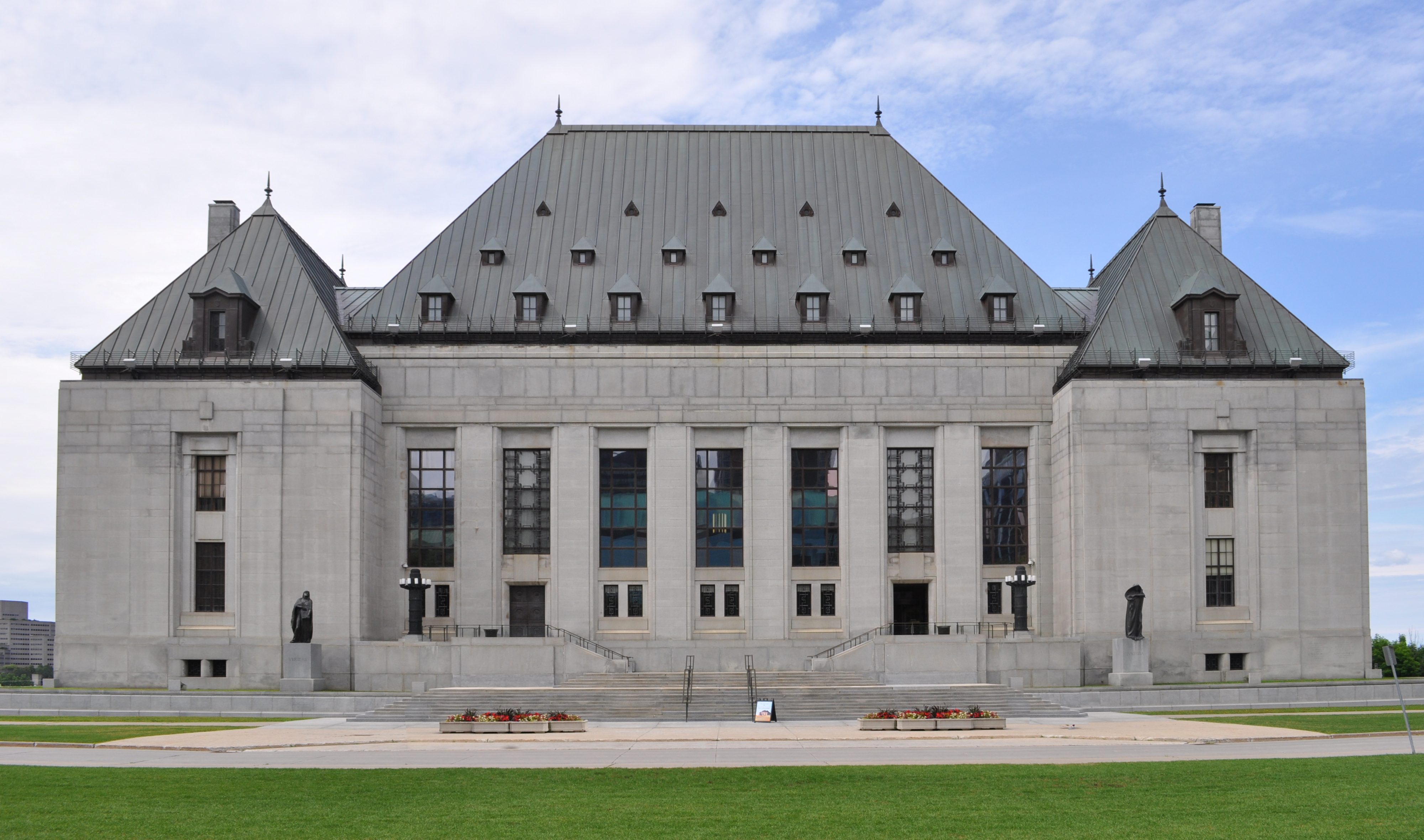|
Reference Question
In law of Canada, Canadian law, a reference question or reference case (formally called abstract review) is a submission by the Canadian government, federal or a Provinces and territories of Canada, provincial government to the courts asking for an advisory opinion on a major legal issue. Typically the question concerns the constitutionality of legislation. Constitutional and statutory authority Reference jurisdiction of the Supreme Court of Canada The ''Constitution Act, 1867'', gives the federal Parliament the power to create a "General Court of Appeal for Canada", but does not define the jurisdiction of the Court.''Constitution Act, 1867'', s. 101. When Parliament created the Supreme Court of Canada in 1875, it gave the Cabinet of Canada, federal Cabinet the power to refer questions to the Supreme Court for the Court's opinion.''The Supreme and Exchequer Court Act'', S.C. 1875, c. 11. That provision has been carried forward and is now found in the current ''Supreme Court Act''. ... [...More Info...] [...Related Items...] OR: [Wikipedia] [Google] [Baidu] |
Law Of Canada
The legal system of Canada is pluralist: its foundations lie in the English common law system (inherited from its period as a colony of the British Empire), the French civil law system (inherited from its French Empire past), and Indigenous law systems developed by the various Indigenous Nations. The Constitution of Canada is the supreme law of the country, and consists of written text and unwritten conventions. The ''Constitution Act, 1867'' (known as the British North America Act prior to 1982), affirmed governance based on parliamentary precedent and divided powers between the federal and provincial governments. The Statute of Westminster 1931 granted full autonomy, and the '' Constitution Act, 1982'' ended all legislative ties to Britain, as well as adding a constitutional amending formula and the ''Canadian Charter of Rights and Freedoms''. The ''Charter'' guarantees basic rights and freedoms that usually cannot be over-ridden by any government—though a notwithstand ... [...More Info...] [...Related Items...] OR: [Wikipedia] [Google] [Baidu] |
Executive Branch
The executive branch is the part of government which executes or enforces the law. Function The scope of executive power varies greatly depending on the political context in which it emerges, and it can change over time in a given country. In democratic countries, the executive often exercises broad influence over national politics, though limitations are often applied to the executive. In political systems based on the separation of powers, government authority is distributed between several branches to prevent power from being concentrated in the hands of a single person or group. To achieve this, each branch is subject to checks by the other two; in general, the role of the legislature is to pass laws, which are then enforced by the executive, and interpreted by the judiciary. The executive can also be the source of certain types of law or law-derived rules, such as a decree or executive order. In those that use fusion of powers, typically parliamentary systems, s ... [...More Info...] [...Related Items...] OR: [Wikipedia] [Google] [Baidu] |
Coffin Affair
The Coffin affair was an event in Canadian history in which a man named Wilbert Coffin was hanged for the murder of three men. The affair started in June 1953 in Gaspésie when three men from Pennsylvania were reported missing. Their bodies were found a month later deep in the woods from the nearest town. Trial and execution The main suspect in the case was Wilbert Coffin, who was found to have many items belonging to the men in his possession. Coffin was sent to trial in July 1954 and though the evidence against him was mostly circumstantial, he was convicted with one count of murder (as the penal code prohibited multiple convictions of murder in the same trial). On August 5 he was sentenced to hang. An appeal to the Quebec Court of Queen's Bench was dismissed. Coffin's application for leave to appeal to the Supreme Court of Canada was turned down but the federal Cabinet submitted a reference question to that Court asking: "If the application made by Wilbert Coffin for le ... [...More Info...] [...Related Items...] OR: [Wikipedia] [Google] [Baidu] |
Reference Re Farm Products Marketing Act
''Reference Re Farm Products Marketing Act (Ontario)'', 1957 S.C.R. 198 is a leading Supreme Court of Canada decision on the Trade and Commerce power allocated to the federal government under section 91(2) of the Constitution Act, 1867. The Court held that the Trade and Commerce power applied not just to trade but also to the flow of goods. The Ontario ''Farm Products Marketing Act'' was challenged as ultra vires the province. The Court split four to four on whether the law was valid. Chief Justice Fauteux, held that the Act had an effect on inter-provincial trade and so it could not be upheld as a "matter of a local nature" under section 92 (16) of the Constitution Act, 1867. Rather, the Act concerned the "flow of goods" which was part of the Trade power. Rand J., in a concurring opinion, added that the demarcation between trade, production, and manufacturing must be considered. “That demarcation must observe this rule, that if in a trade activity, including manufacture or p ... [...More Info...] [...Related Items...] OR: [Wikipedia] [Google] [Baidu] |
Anti-Inflation Reference
''Reference Re Anti-Inflation Act'', 9762 S.C.R. 373 was a landmark reference question opinion of the Supreme Court of Canada on the constitutionality of the ''Anti-Inflation Act''.''Anti-Inflation Act'', SC 1975, c. 75. In what has become among the most significant federalism cases of the Supreme Court, the Act was held to be within the power of the federal government. The ''Anti-Inflation Act'' was passed in 1975, on recommendation of the Bank of Canada, to control the growing inflation of the past several years. Due to growing unease with the Act, the federal government put two questions to the Supreme Court on the validity of the Act. The major question being whether the Act was ultra vires of the federal government. First, the Court noted that the subject-matter of the Act being inflation made it impossible to assign to one of the enumerated powers in the ''Constitution Act, 1867''. Consequently, the Act would be able to be upheld only under the peace, order and good government ... [...More Info...] [...Related Items...] OR: [Wikipedia] [Google] [Baidu] |
Reference Re Authority Of Parliament In Relation To The Upper House
A reference is a relationship between objects in which one object designates, or acts as a means by which to connect to or link to, another object. The first object in this relation is said to ''refer to'' the second object. It is called a ''name'' for the second object. The next object, the one to which the first object refers, is called the ''referent'' of the first object. A name is usually a phrase or expression, or some other symbolic representation. Its referent may be anything – a material object, a person, an event, an activity, or an abstract concept. References can take on many forms, including: a thought, a sensory perception that is audible (onomatopoeia), visual (text), olfactory, or tactile, emotional state, relationship with other, spacetime coordinates, symbolic or alpha-numeric, a physical object, or an energy projection. In some cases, methods are used that intentionally hide the reference from some observers, as in cryptography. References feature in man ... [...More Info...] [...Related Items...] OR: [Wikipedia] [Google] [Baidu] |
Reference Re Manitoba Language Rights
''Reference Re Manitoba Language Rights,'' 9851 S.C.R. 721, was a reference question posed to the Supreme Court of Canada regarding provisions in the '' Manitoba Act, 1870'' stipulating the provision of French language services in the province of Manitoba. The Court heard the appeal in June 1984 and gave its ruling a year later, on June 13, 1985. Four questions were asked: # Are sections 133 of the ''Constitution Act, 1867'', and 23 of the ''Manitoba Act, 1870'', requiring laws be in both French and English, mandatory in Manitoba, Quebec, and Parliament? # If so, are those Manitoban laws not printed in both languages invalid under section 23 of the ''Manitoba Act, 1870''? # If so, do the laws have any force and effect, and if so to what extent? # Are any of the provisions of '' An Act Respecting the Operation of Section 23 of the Manitoba Act in Regard to Statutes'' inconsistent with section 23 of the '' Manitoba Act, 1870'', and if so are the provisions invalid and of no legal f ... [...More Info...] [...Related Items...] OR: [Wikipedia] [Google] [Baidu] |
David Milgaard
David Milgaard (July 7, 1952 – May 15, 2022) was a Canadian man who was wrongfully convicted for the 1969 rape and murder of nursing student Gail Miller in Saskatoon and imprisoned for 23 years. He was eventually released and exonerated. Up until his death, he lived in Alberta and was employed as a community support worker. Milgaard was also a public speaker who advocated for the wrongfully convicted and for all prisoners' rights. Arrest, trial and exoneration In January 1969, 16-year-old Milgaard and his friends Ron Wilson and Nichol John embarked on a trip across Canada. The three were in Saskatoon, Saskatchewan, visiting their friend Albert Cadrain when a 20-year-old nursing student, Gail Miller, was found dead on a snowbank in the vicinity of the Cadrain home. Under pressure to solve a crime that had generated significant publicity, police focused their attention on Milgaard, Wilson and John. In an attempt to clear his name and assist the investigation, Milgaard turned h ... [...More Info...] [...Related Items...] OR: [Wikipedia] [Google] [Baidu] |
Same-Sex Marriage
Same-sex marriage, also known as gay marriage, is the marriage of two people of the same legal sex. marriage between same-sex couples is legally performed and recognized in 38 countries, with a total population of 1.5 billion people (20% of the world's population). The most recent jurisdiction to legalize same-sex marriage is Thailand. Same-sex marriage is legally recognized in a large majority of the world's developed countries; notable exceptions are Italy, Japan, South Korea and the Czech Republic. Adoption rights are not necessarily covered, though most states with same-sex marriage allow those couples to jointly adopt as other married couples can. Some countries, such as Nigeria and Russia, restrict advocacy for same-sex marriage. A few of these are among the 35 countries (as of 2023) that constitutionally define marriage to prevent marriage between couples of the same sex, with most of those provisions enacted in recent decades as a preventative measure. Other countr ... [...More Info...] [...Related Items...] OR: [Wikipedia] [Google] [Baidu] |
Reference Re Supreme Court Act, Ss
A reference is a relationship between objects in which one object designates, or acts as a means by which to connect to or link to, another object. The first object in this relation is said to ''refer to'' the second object. It is called a ''name'' for the second object. The next object, the one to which the first object refers, is called the ''referent'' of the first object. A name is usually a phrase or expression, or some other symbolic representation. Its referent may be anything – a material object, a person, an event, an activity, or an abstract concept. References can take on many forms, including: a thought, a sensory perception that is audible (onomatopoeia), visual (text), olfactory, or tactile, emotional state, relationship with other, spacetime coordinates, symbolic or alpha-numeric, a physical object, or an energy projection. In some cases, methods are used that intentionally hide the reference from some observers, as in cryptography. References feature in many ... [...More Info...] [...Related Items...] OR: [Wikipedia] [Google] [Baidu] |


